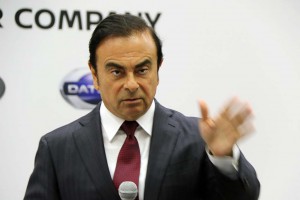
Nissan Renault CEO Carlos Ghosn is putting the company's investments in Great Britain on hold pending Brexit negotiations.
The top executive at Nissan Renault, Carlos Ghosn, has warned that decisions on the company’s future investments in Great Britain are on hold pending the outcome of the United Kingdom “Brexit” negotiations regarding future market access to the countries within the European Union.
Ghosn, however, told the BBC that he was “reasonably confident” that the company will not have to shut down its plant in Great Britain even though the factory in Sunderland now exports most of production to Europe and North America.
But like other major companies, Renault-Nissan is now waiting to find out exactly what “Brexit” means and what kind of trading relationship the UK will have with the rest of Europe when negotiations are complete.
The decision by British voters to exit the European Union also could upset access to the United States market, which is guaranteed by the EU’s open trade relations with Canada and U.S. post Brexit, Britain will have to forge some kind of trade agreement with the U.S.
Ghosn told the BBC: “I don’t think today you can talk about any impact before we see what is the new status of the UK. The question of Sunderland – Sunderland is a plant which is a European plant based in the UK.
(Nissan enjoys strong quarterly earnings. To get the details, Click Here.)
“Most of the production out of Sunderland is exported to Europe. So obviously for us the relationship which is going to prevail between the UK and Europe is very important,” Ghosn said. General Motors also has warned its assembly plant in Great Britain also could be forced to close.
In addition to making exports from Great Britain more costly, some analysts fear that Brexit is likely to curb sales of new vehicles in Great Britain, which could also increase the economic pressure on plants operated by companies such as Nissan and GM.
Before Brexit vote experts had predicted that a vote to leave could trigger a recession in Great Britain and series of recent reports, including the decline in the sales of new vehicles, indicate the U.K’s economy is facing recession.
(Click Here for more about Nissan’s launch of ProPilot.)
The Bank of England has cut interest rates and offered a bigger economic stimulus package than expected, though analysts are suggesting it won’t be large enough to counter the downward economic downward spiral, which could force the British government to cut spending on various programs.
The Bank’s growth forecasts for the next three years have been revised sharply downward. It projects that unemployment is set to rise and inflation will likely shoot well over its 2% target by 2018. Britain’s GDP growth for 2017 is set to drop to 0.8%, half of the figure forecast for the eurozone.
Manufacturing and services activity are at a seven-year low in Great Britain. JP Morgan CEO Jamie Dimon has warned that 4,000 jobs might have to move overseas, warnings echoed by HSBC and Morgan Stanley. Rynair has trimmed flight schedules to London to focus on European destinations outside the U.K.
(To see more about Nissan’s effort to fuel sales growth, Click Here.)
The Bank of England’s forecast also is very different from the last quarterly report before the referendum, which projected growth to be 2.3% next year, an improvement from this year’s 2%.
